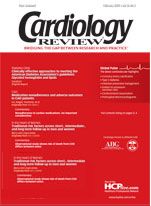Publication
Article
Metformin may improve outcomes in diabetic patients with heart failure
Diabetes and heart failure
Metformin may improve survival and other clinical outcomes in patients with type 2 diabetes and heart failure, according to a recent study in Diabetes Care (2005;28[10]:2345-2351).
Despite increasing evidence of potential benefit, metformin is considered contraindicated in patients with heart failure because of concerns over lactic acidosis. “Although the contraindication to metformin arose over concerns about the potential for lactic acidosis and its relation to phenformin…there is a paucity of evidence that actually links metformin with lactic acidosis,” write the authors, led by Jeffrey A. Johnson, PhD, associate professor, department of public health sciences, and fellow, Institute of Health Economics, University of Alberta, Edmonton.
Metformin improves glycemic control and other cardiovascular risk factors, and in obese diabetic subjects metformin has been shown to reduce mortality. Furthermore, a large-scale observational study suggested that metformin therapy was associated with a reduced risk for all-cause mortality at 1 year in a hospitalized elderly Medicare population with heart failure and type 2 diabetes.
Because few options exist to treat heart failure in patients with diabetes, 10% to 15% of patients with heart failure and diabetes still use metformin. The investigators sought to determine whether such metformin use is appropriate by examining outcomes in a broad unselected population-based cohort of patients with heart failure and type 2 diabetes who were treated with metformin or other oral antidiabetic medications.
Using the Saskatchewan Health databases, they identified 12,272 new users of oral antidiabetic drugs, 1,833 of whom developed heart failure, and grouped them according to the type of antidiabetic therapy they were receiving. Of this cohort, 42% were treated with sulfonylureas alone, 11% were treated with metformin alone, and 47% received both a sulfonylurea and metformin. The mean age of the cohort was 72 years.
After a mean follow-up of 2.5 years, 52% of patients on sulfonylurea monotherapy died compared with only 33% on metformin monotherapy and 31% on combination therapy. A reduction in deaths or hospitalizations was also observed among metformin users: 85% on sulfonylurea monotherapy either died or were hospitalized compared with 77% on metformin monotherapy and 80% on combination therapy. There was no difference in time to first hospitalization between the groups.
In multivariate regression analyses, metformin alone or in combination with other agents was associated with reduced all-cause mortality and the composite of death and hospitalization compared with sulfonylurea monotherapy.
There were no hospitalizations or deaths in any of the cohorts attributed to metabolic acidosis throughout the follow-up period, the authors noted.
“Metformin therapy has been shown to improve hyperinsulinemia in patients with type 2 diabetes. It is therefore conceivable that, through this action, metformin therapy may be associated with improved outcomes in patients with heart failure and type 2 diabetes,” according to the investigators. “At the very least, our study suggests that metformin is not associated with an increased risk of adverse outcomes in heart failure patients when compared with sulfonylurea therapy (the most commonly prescribed oral antidiabetic agents, which increase en-dogenous insulin secretion and may be associated with adverse cardiovascular outcomes).”
They continue, “Whether our findings are sufficiently robust to either liberalize the careful use of metformin in diabetic heart failure patients or simply engender sufficient equipoise to mandate a randomized trial is a question of clinical judgment.”
